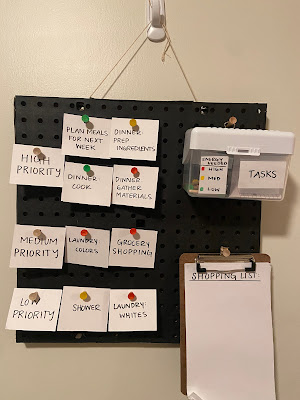As a part of the Nero Aspects course I am taking in OT school, I participated in a clinical simulation encounter today, during which I administered a cognitive screening to a person with a recent history of stroke. Cognition is how we gain knowledge through experiences, thoughts, and senses. Occupational therapists have a significant role in rehabilitating and caring for clients suffering from cognitive decline or deficits. Occupational Therapists usually do this by focusing on functional cognition, or how an individual uses their thinking or processing skills to participate in everyday activities. They can measure the level of cognitive impairment and their ability to perform meaningful daily activities through assessments. The information gathered from assessments can help the OT and their client identifies strategies to compensate for cognitive loss and adapt their environment to increase independence. For example, the client I assessed today was suffering from memory loss. Suppose OT services were thought to be needed after completing assessments to determine the severity of the memory loss or cognitive loss. In that case, OTs could help implement a routine with adaptations to their environment that could cue them to complete certain activities of daily living or remind them of steps they most often forget.
In the clinical simulation, my client scored a 21 on the Saint Louis University Mental Status Examination or SLUMS, a screening designed to screen for cognitive impairment. Based on his score and level of education, this would indicate a mild cognitive impairment. It is common for individuals with mild cognitive impairments to have memory loss, making remembering tasks, appointments, or recent events difficult. Not all mild cognitive impairment impacts memory; individuals experience more cognitive-related deficits, visual perception issues, or even affect their judgment. During the screening, for example, my client showed evidence of left neglect following his right hemisphere CVA or stroke. Left neglect is when an individual shows limited awareness of stimuli on the left side of the body. While I did explain what occupational therapy is to the client, I felt I could have given more specific examples based on the client's diagnosis and concerns about memory loss. I struggled with the idea of getting too specific before the screening since we had not yet determined if Occupational Therapy services were needed with this client. If there was more time following the screening or ideally after we could communicate the results with the client, I would have loved to explain how OT can impact their specific concerns. Based on the little I knew about my client at the time, I felt I provided enough information about Occupational Therapy for the client to feel comfortable completing the assessment and understand on a general level what Occupational Therapists do.
During the encounter, despite my nerves, I was proud of how clearly I could communicate the screening questions to the client. I thought that I had good pacing and could engage with the client, define the role of OT, describe the screening, and complete the screening within the 10-minute time without feeling rushed. After reviewing my video, I realized that while I could conduct the screening, I did not have as much time to build rapport with the client as I would have liked. The client was open and willing to share information about their life during the assessment, which I felt could derail the screening, so I moved the conversation along. If I had engaged in more discussion before the screening, I could have learned more about my client and let them get to know me more. Overall this clinical simulation was a great experience. I have been feeling like an imposter in my program, and as our first fieldwork experience grows nearer, it has been causing a lot of anxiety and doubt. This simulation allowed me to begin to feel less like an imposter. While nerve-racking, getting to experience working with a client that was not one of my classmates in a low-stakes environment helped to build my confidence. Going forward, I will have more faith in my abilities and everything I have learned thus far.
B

Comments
Post a Comment